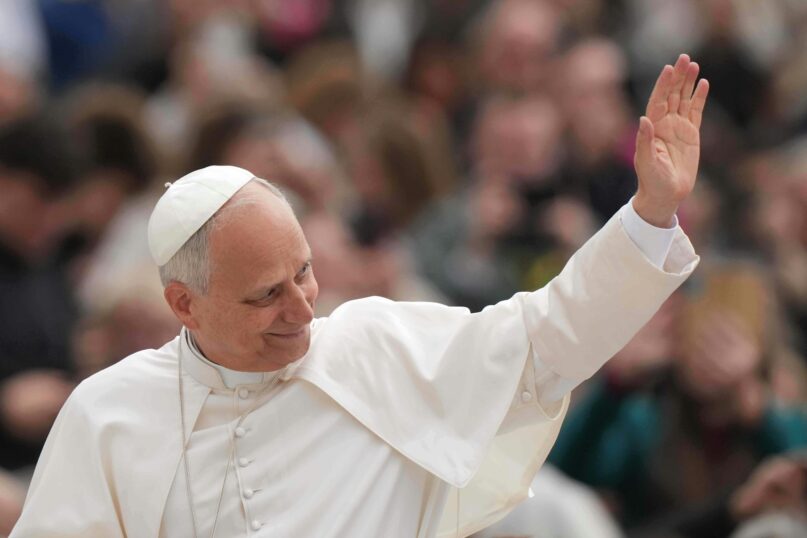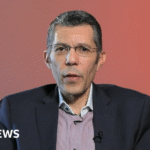(RNS) — Immediately after his election, Robert Prevost signaled his commitment to Catholic social teaching by choosing Leo as his papal name. As he explained to the College of Cardinals, he chose his name “mainly because Pope Leo XIII in his historic Encyclical Rerum Novarum addressed the social question in the context of the first great industrial revolution.”
That encyclical defended the rights of workers and provided an alternative to a bipolar world of unregulated capitalism and communism. In the words of Leo XIV, it pointed “to the intolerable living conditions of many industrial workers” and argued “for the establishment of a just social order.”
And today, the pope argues the church’s social teaching needs to respond “to another industrial revolution and to developments in the field of artificial intelligence that pose new challenges for the defence of human dignity, justice and labour.”
In his first apostolic exhortation, “Dilexi Te,” Pope Leo begins to lay out his vision of Catholic social teaching. It begins with Scripture and the church’s commitment to the poor, which was part of the life of the church long before his 19th-century predecessor systematized the church’s social teaching in papal teaching.
Leo also acknowledges that the church is not alone in thinking about “technological and social change in the past two centuries, with all its contradictions and conflicts.” It can learn from the poor how it has impacted their lives. In addition, he writes, the church has benefited from “the various movements of workers, women and young people, and the fight against racial discrimination,” which “gave rise to a new appreciation of the dignity of those on the margins of society.”
Catholic social teaching cannot be produced by clerics working in isolation in the backrooms of the Vatican. “The epochal change we are now undergoing makes even more necessary a constant interaction between the faithful and the Church’s Magisterium, between ordinary citizens and experts, between individuals and institutions,” the pope writes. In this process, the poor possess “unique insights indispensable to the Church and to humanity as a whole.”

Pope Leo XIV arrives for his weekly general audience in St. Peter’s Square, at the Vatican, on Oct. 22, 2025. (AP Photo/Andrew Medichini)
In his apostolic exhortation, Leo embraces the contributions of his predecessors to the development of Catholic social teaching, especially John XIII, Paul VI, John Paul II, Benedict XVI and Francis.
He recalls, “At the opening of the second session of the Council, Saint Paul VI took up this concern voiced by his predecessor, namely that the Church looks with particular attention ‘to the poor, the needy, the afflicted, the hungry, the suffering, the imprisoned, that is, she looks to all humanity that suffers and weeps: she is part of them by evangelical right.’”
He quotes the Second Vatican Council document Gaudium Spes, which reads, “God destined the earth and all it contains for all people and nations so that all created things would be shared fairly by all humankind under the guidance of justice tempered by charity. … In their use of things people should regard the external goods they lawfully possess as not just their own but common to others as well, in the sense that they can benefit others as well as themselves.”
“Therefore,” the council continues, “everyone has the right to possess a sufficient amount of the earth’s goods for themselves and their family. … Persons in extreme necessity are entitled to take what they need from the riches of others. … By its nature, private property has a social dimension that is based on the law of the common destination of earthly goods. Whenever the social aspect is forgotten, ownership can often become the object of greed and a source of serious disorder.”
Leo quotes John Paul II who said that the church’s preferential relationship with the poor “cannot but embrace the immense multitudes of the hungry, the needy, the homeless, those without medical care and, above all, those without hope of a better future.”
Leo also cites the conferences of the Latin American bishops held in Medellín, Colombia; Puebla, Mexico; Santo Domingo, Dominican Republic; and Aparecida, Brazil. He favorably refers to their description of the structures of injustice as a “social sin.” He agrees with them on the urgent need to “resolve the structural cause of poverty.”
“We must continue,” Leo writes, quoting Pope Francis’ apostolic exhortation “Evangelii Gaudium,” “to denounce the ‘dictatorship of an economy that kills,’ and to recognize that ‘while the earnings of a minority are growing exponentially, so too is the gap separating the majority from the prosperity enjoyed by those happy few. This imbalance is the result of ideologies that defend the absolute autonomy of the marketplace and financial speculation. Consequently, they reject the right of states, charged with vigilance for the common good, to exercise any form of control.’”
Like Francis in “Dilexit Nos,” Leo bemoans the fact “that social sin consolidates a ‘structure of sin’ within society and is frequently part of a dominant mindset that considers normal or reasonable what is merely selfishness and indifference. … It then becomes normal to ignore the poor and live as if they do not exist.”
Leo condemns an economy organized “in such a way that sacrifices are demanded of the masses in order to serve the needs of the powerful. Meanwhile, the poor are promised only a few ‘drops’ that trickle down.”
He calls on the people of God “to make their voices heard … to point out and denounce such structural issues, even at the cost of appearing foolish or naïve. Unjust structures need to be recognized and eradicated by the force of good, by changing mindsets but also, with the help of science and technology, by developing effective policies for societal change.”
Leo seems to realize that many people think the church should stick to personal ethics and stay away from economics. But, he writes, the “Gospel message has to do not only with an individual’s personal relationship with the Lord, but also with something greater: ‘the Kingdom of God.’”
As a result, “Spiritual conversion, the intensity of the love of God and neighbor, zeal for justice and peace, the Gospel meaning of the poor and of poverty, are required of everyone.”
He continues, saying that no Christian can regard the poor as a societal problem, but must be considered part of our family and given respect. The rich man in the Gospel story was not punished for stealing from others but because “in his prosperity, he preserved no sense of justice; the wealth he had received made him proud and caused him to lose all sense of compassion.”
“We must never forget that religion, especially the Christian religion, cannot be limited to the private sphere, as if believers had no business making their voice heard with regard to problems affecting civil society and issues of concern to its members,” the pope writes.
Those who hoped an American pope would be more supportive of unregulated capitalism will be very disappointed in Leo. He is not afraid to embrace the Catholic social teaching concern for workers and the poor, rather than the invisible hand of the market.
There will be no turning back from the positions taken by earlier popes challenging the status quo that ignores the needs of the poor. He will continue to develop this teaching by applying it to our times.



